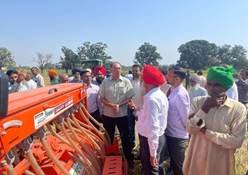Agri Ministry addresses Crop Residue Management issues in Punjab
State officials chalk out a comprehensive action plan for effective control of paddy stubble burning during the ensuing season
Dr Abhilaksh Likhi, Additional Secretary, Ministry of Agriculture & Farmers Welfare, Department of Agriculture & Farmers Welfare attended a farm demonstration on crop residue management at village Rangian in Kharar tehsil, District SAS Nagar, Punjab and interacts with farmers.
The objectives of the Crop Residue Management (CRM) Scheme includes :-
– Protecting environment from air pollution and preventing loss of nutrients and soil micro-organisms caused by burning of crop residue.
– Promoting management of crop residue by retention/incorporation into the soil or collection for further utilisation through the use of appropriate mechanisation inputs.
– Promoting Farm Machinery Banks for custom hiring of crop residue management machinery to offset the adverse economies of scale arising due to small landholding and high cost of individual ownership.
– Creating awareness among stakeholders through demonstration, capacity building activities and differentiated Information, Education and Communication strategies for effective utilisation and management of crop residue.
Dr Likhi puts emphasis on effective control of paddy stubble burning during the ensuing season, the States should chalk out a comprehensive action plan at micro level, establish a mechanism to ensure effective utilisation of machines, promote use of bio-decomposer in a complimentary mode with the CRM machines, promote ex-situ utilisation of straw by way of mapping demand from adjoining industries like biomass based power plants, bioethanol plants etc.
State officials chalk out a comprehensive action


